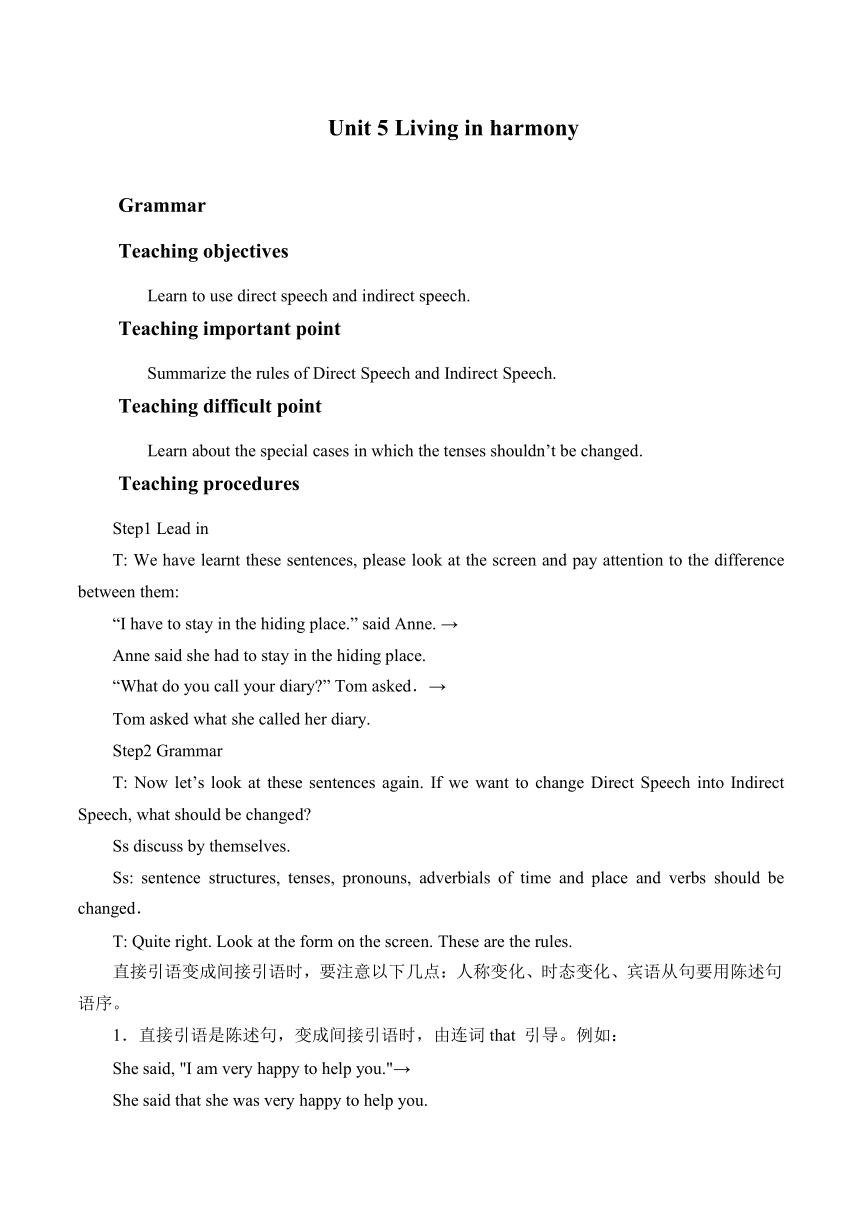牛津上海版高中二年级第二册英语 - Unit 5 Living in harmony_教案2
文档属性
| 名称 | 牛津上海版高中二年级第二册英语 - Unit 5 Living in harmony_教案2 |

|
|
| 格式 | zip | ||
| 文件大小 | 5.5KB | ||
| 资源类型 | 教案 | ||
| 版本资源 | 牛津上海版(试用本) | ||
| 科目 | 英语 | ||
| 更新时间 | 2020-03-20 00:00:00 | ||
图片预览

文档简介
Unit 5 Living in harmony
Grammar
Teaching objectives
Learn to use direct speech and indirect speech.
Teaching important point
Summarize the rules of Direct Speech and Indirect Speech.
Teaching difficult point
Learn about the special cases in which the tenses shouldn’t be changed.
Teaching procedures
Step1 Lead in
T: We have learnt these sentences, please look at the screen and pay attention to the difference between them:
“I have to stay in the hiding place.” said Anne. →
Anne said she had to stay in the hiding place.
“What do you call your diary?” Tom asked.→
Tom asked what she called her diary.
Step2 Grammar
T: Now let’s look at these sentences again. If we want to change Direct Speech into Indirect Speech, what should be changed?
Ss discuss by themselves.
Ss: sentence structures, tenses, pronouns, adverbials of time and place and verbs should be changed.
T: Quite right. Look at the form on the screen. These are the rules.
直接引语变成间接引语时,要注意以下几点:人称变化、时态变化、宾语从句要用陈述句语序。
1.直接引语是陈述句,变成间接引语时,由连词that 引导。例如:
She said, "I am very happy to help you."→
She said that she was very happy to help you.
2.直接引语是一般/选择疑问句,变成间接引语时,由连词whether或if 引导。例如:
He asked me, "Do you like playing football?"→
He asked me if/whether I liked playing football.
注意:大多数情况下,if和whether 可以互换,但后有or not,或在动词不定式前,或放在介词后作连接词时,一般只用whether。例如:
She asked me whether he could do it or not.
3.直接引语是特殊疑问句,变成间接引语时,由相应的疑问词who, whom, whose, how, when, why, where 等引导。例如:
My sister asked me, "How do you like the film?"→
My sister asked me how I liked the film.
5.一些注意事项
(1)间接引语一般要用陈述句的语序,即主、谓、宾的顺序。例如:
He asked Lucy, "Where did you go?"→
He asked Lucy where she went.
Tom said, "What do you want, Ann?"→
Tom asked Ann what she wanted.
(2)直接引语是客观事实、普遍真理等,变成间接引语时,时态不变。例如:
They told their son, "The earth goes round the sun."→
They told their son that the earth goes round the sun.
(3)直接引语变间接引语时, 指示代词、时间状语、地点状语等要作相应的变化。例如:
He said, "I haven't seen her today."→
He said that he hadn't seen her that day.
注意:如果转述时就在原来的地方,就在说话的当天,就不必改变指示代词、时间状语、地点状语等。
Step3 practice
T: Please change the following direct speech into indirect speech and indirect into direct.
“I’m going to hide from the Germans,” Anne said.
“I don’t know the address of my new home,” said Anne.
“I cannot ask my father because it is not safe to know,” she said.
“I had to pack up my things very quickly,” the girl said.
“Why did you choose your diary and old letters?” Dad asked her.
Step4 Correcting mistakes
T analyses the common mistakes Ss have made during the practice.
T: Now let’s look at the screen and pay attention to these sentences. Choose the right sentence and tell me why the other one is wrong.
Step5 Homework
Grammar
Teaching objectives
Learn to use direct speech and indirect speech.
Teaching important point
Summarize the rules of Direct Speech and Indirect Speech.
Teaching difficult point
Learn about the special cases in which the tenses shouldn’t be changed.
Teaching procedures
Step1 Lead in
T: We have learnt these sentences, please look at the screen and pay attention to the difference between them:
“I have to stay in the hiding place.” said Anne. →
Anne said she had to stay in the hiding place.
“What do you call your diary?” Tom asked.→
Tom asked what she called her diary.
Step2 Grammar
T: Now let’s look at these sentences again. If we want to change Direct Speech into Indirect Speech, what should be changed?
Ss discuss by themselves.
Ss: sentence structures, tenses, pronouns, adverbials of time and place and verbs should be changed.
T: Quite right. Look at the form on the screen. These are the rules.
直接引语变成间接引语时,要注意以下几点:人称变化、时态变化、宾语从句要用陈述句语序。
1.直接引语是陈述句,变成间接引语时,由连词that 引导。例如:
She said, "I am very happy to help you."→
She said that she was very happy to help you.
2.直接引语是一般/选择疑问句,变成间接引语时,由连词whether或if 引导。例如:
He asked me, "Do you like playing football?"→
He asked me if/whether I liked playing football.
注意:大多数情况下,if和whether 可以互换,但后有or not,或在动词不定式前,或放在介词后作连接词时,一般只用whether。例如:
She asked me whether he could do it or not.
3.直接引语是特殊疑问句,变成间接引语时,由相应的疑问词who, whom, whose, how, when, why, where 等引导。例如:
My sister asked me, "How do you like the film?"→
My sister asked me how I liked the film.
5.一些注意事项
(1)间接引语一般要用陈述句的语序,即主、谓、宾的顺序。例如:
He asked Lucy, "Where did you go?"→
He asked Lucy where she went.
Tom said, "What do you want, Ann?"→
Tom asked Ann what she wanted.
(2)直接引语是客观事实、普遍真理等,变成间接引语时,时态不变。例如:
They told their son, "The earth goes round the sun."→
They told their son that the earth goes round the sun.
(3)直接引语变间接引语时, 指示代词、时间状语、地点状语等要作相应的变化。例如:
He said, "I haven't seen her today."→
He said that he hadn't seen her that day.
注意:如果转述时就在原来的地方,就在说话的当天,就不必改变指示代词、时间状语、地点状语等。
Step3 practice
T: Please change the following direct speech into indirect speech and indirect into direct.
“I’m going to hide from the Germans,” Anne said.
“I don’t know the address of my new home,” said Anne.
“I cannot ask my father because it is not safe to know,” she said.
“I had to pack up my things very quickly,” the girl said.
“Why did you choose your diary and old letters?” Dad asked her.
Step4 Correcting mistakes
T analyses the common mistakes Ss have made during the practice.
T: Now let’s look at the screen and pay attention to these sentences. Choose the right sentence and tell me why the other one is wrong.
Step5 Homework
